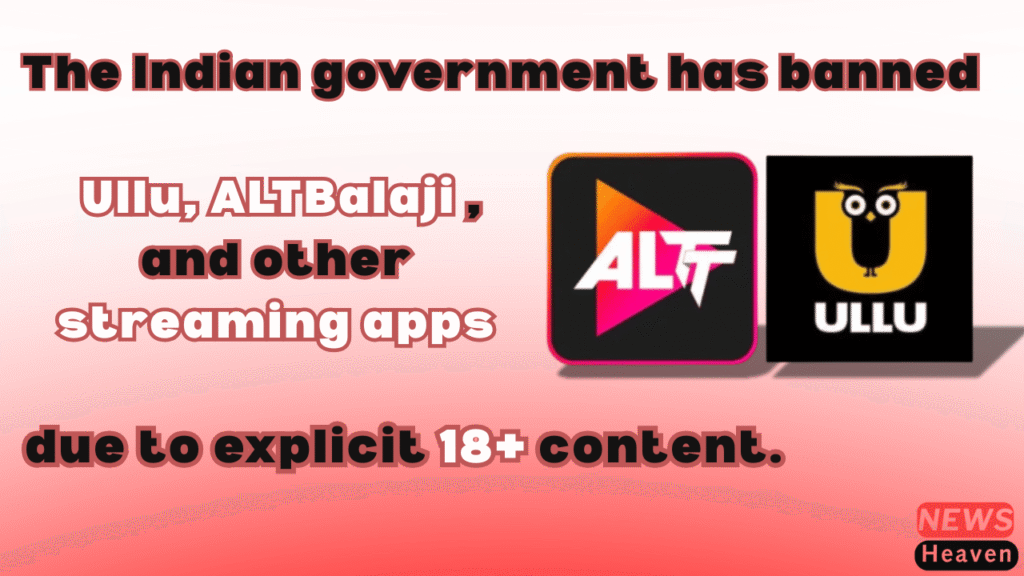The Indian government has banned Ullu, ALTBalaji, and other streaming apps due to explicit 18+ content. Find out why these apps were targeted, what it means for users, and the future of digital streaming regulation in India.

The Indian government has officially banned numerous popular streaming platforms, including Ullu, ALTBalaji, and other similar apps. This has caused a lot of people in India to raise their eyebrows. The 18+ explicit content on these sites has caused a lot of controversy in India regarding censorship, content control, and the future of digital media.
In this post, we’ll talk about why the ban happened, what it means for users and streaming services, and the bigger issue of regulating digital material in India.
1. Why did the Indian government stop people from using streaming apps like Ullu and ALTBalaji?
The Indian government has been worried for a long time about pornographic content being shared on streaming sites. Platforms like Ullu and ALTBalaji have become very famous because of their mature and daring content, but they have also come under fire for having 18+ content that some people say is not suitable for all audiences.
The government’s decision to ban these sites is part of a larger effort to control the expanding OTT (Over-The-Top) streaming business, which has mostly been running without tight content rules. The Ministry of Electronics and Information Technology (MeitY) said that the platforms were taken down from app stores and prohibited for users in India because they did not follow the country’s content rules.
2. What Content Got the Ban?
The main reason these streaming applications are banned is because they have explicit and adult content. Shows on sites like Ullu are recognized for having adult themes, like nudity, sexually explicit scenes, and themes that some parts of the Indian populace find culturally sensitive or insulting.
Important reasons for the ban:
- Mature Content: Ullu, ALTBalaji, and other platforms were found to have content that isn’t appropriate for all ages and often goes too far with sexual themes.
- Failure to Follow Content Guidelines: Even though India has laws for OTT platforms about what kind of content they can show, many streaming services didn’t do a good job of moderating their content or following the standards for digital media platforms.
- popular and Government Outcry: The government was under more pressure to act because of popular anger, social media campaigns, and requests from family-oriented groups.
3. What this means for streaming services and their users
Banning apps like Ullu and ALTBalaji has big effects on both the streaming platforms and the people who use them:
- Effect on Streaming Platforms: These platforms, which have built up big followings in India, now run the risk of losing a lot of users. The restriction also has an effect on their economic strategy, especially in the competitive OTT sector, where content is king. Content makers and service providers will now have to deal with stricter rules and may need to change their content to avoid more fines.
- Impact on Users: Users will no longer be able to access material from these platforms without utilizing VPNs or other workarounds because of the prohibition. Censorship also makes people worried about the freedom of choice for people who use digital media in India. Some people think that people should be able to pick what kind of information they watch, while others think that the government’s choice is vital to defend cultural values.
4. What does this mean for the bigger picture of regulating digital content in India?
The Indian government is doing this as part of a bigger effort to control the quickly rising digital entertainment industry. Over the past several years, India’s OTT sector has grown a lot. Streaming services like Netflix, Amazon Prime Video, and others have become well-known. But the rise of smaller platforms that carry pornographic content has some officials worried.
Important things to know about India’s potential content regulation:
- Stricter Content Guidelines: After this prohibition, the government will probably make streaming sites follow even stricter rules about what they can show. The OTT Content Guidelines could change to make sure that content fits with the country’s social and cultural norms.
- More Censorship: The move could lead to more censorship of digital content, with the government putting in place stricter rules to limit what content can be presented to the public.
- Other OTT platforms are under pressure: Big streaming companies will now have to make sure that their content follows the rules. Not following the rules could have the same effects.
5. How can streaming services stay out of trouble in the future?
Streaming services in India need to be tighter about how they moderate content to avoid future bans or limitations. Here are a few things they can do:
- Follow Content Guidelines: Streaming services must make sure that their content follows India’s legal and cultural rules. This may mean blocking off adult content, making age-based categories better, and giving parents a way to regulate what their kids can see.
- Set up content moderation systems: Platforms should spend money on better tools for moderating content so that incorrect content doesn’t get out, which could cause public outrage or government action.
- Talk to regulatory agencies: Streaming providers can stay in compliance and avoid problems in the future by talking to government regulatory agencies and obeying their rules.
6. Looking Ahead: Streaming in India in the Future
The entertainment scene in India is changing quickly, and people are becoming more interested in digital content. But it’s still challenging to find a balance between freedom of speech and being sensitive to other cultures. The new restriction is probably only the start of a bigger effort by the government to limit what Indian viewers may see.
As streaming services gain popularity, OTT platforms must navigate a delicate balance between granting creators autonomy and adhering to local laws. In the end, this problem brings up the bigger subject of free speech and expression vs content regulation in India’s quickly increasing digital arena.
In conclusion
The Indian government’s ban on streaming apps like Ullu and ALTBalaji for showing adult content has started an important conversation about how digital content will be regulated in the future. Some people think the decision was vital to maintain cultural values, while others think it limits personal freedom and choice. As the government makes rules harsher, both streaming services and users will have to adjust to the new world of digital media in India.
Also read:
Atheist Krishna: The Meme Creator Who Made PM Modi Smile—A Life Cut Short by Pneumonia




